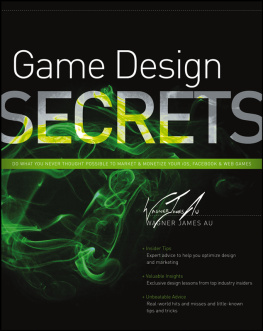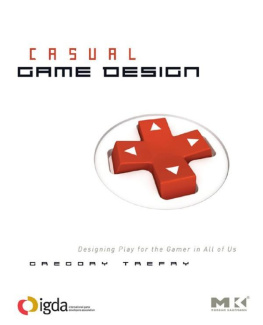Life is a child, being a child, playing a game.
Heraclitus (Fragment 52, 500 BC)
Football is like life.
Vince Lombardi (AD 1967)
What if life is a game? Great thinkers have If we were to list every author, philosopher, business guru, and coach who has made this comparison, it would take dozens of pages.
Very wellbut what if? What does it mean that life is a game? Most of the great thinkers were speaking in metaphors, saying that life is like a game. They were using games to explain something about life. But lets go farther than that. Lets take the great thinkers at face value: lets assume that life really is a game.
What does that mean? It means that we are all players, that there are pieces and moves, and most importantly, theres victory and defeat. If life is a game, you can move your pieces well or badly, and you can win or lose. This opens up quite a few points of discussion, about what kind of game this is, what sort of pieces we control, and how to play.
There is a problem, though: Nobody knows what winning is. Not for certain, anyway. We have various ideas about it, but theres no general consensus about victory. Were in this odd situation that philosopher Martin Heidegger called geworfenheit , which we will try to translate and explain later. For now, the basic idea is that weve been thrown into a game and we are not quite sure what to do.
If nothing else, this situation is interesting. Its not boring, far from it! We stand before a vast mystery: What is this game? And what is the objective?
Theres nothing new in these questions. As we just said, great minds have been wrestling with them for a long time. Whats new is an enhanced ability to discuss them. Theres a new academic field devoted to games and game design. For about 100 years (going back to the fields founder, Johan Huizinga), more and more professors and researchers have been thinking hard about what games are, how they work, and what they tell us about all kinds of phenomena, from education to the firing of neurons in the brain. Its time to set all this knowledge on a new questto discover what game design says about the human condition.
What can a game scholar say about being human that has not been said before? Here is one little example. You may have noticed that people act differently in different situations. We adopt roles depending on our surroundings. All the worlds a stage, said Shakespeare. Well, there is a genre of games called role-playing games (RPGs) designed to take advantage of precisely this feature of being human. Through RPGs, game designers and game researchers have learned interesting things about humans and their roles. People want to be heroes. They crave agency, and the ability to do something that matters. They want meaning. Perhaps we knew all that before, but until the advent of videogames and their explosion into the media sphere, we did not know how many people wanted to be heroes nor how intensely they desired it. It is now considered ordinary in the game industry that a player might spend twenty to forty hours a week playing just one RPG. Its ho-hum for game designers, but a serious wake-up call to people concerned about the human condition.
This book is about the human condition as it is reflected in game thinking. If you were a gamer and a ponderer of the human condition, what would life look like to you? How would you think about it?
Stances and the Strategic Layer
The first thing a game scholar might notice that others would not would be a type of thinking, a mode of approach that game design emphasizes more than other fields. There is a layer of thought, just below the level of our grand philosophical commitments, where we translate the grand commitments into general norms of action. It could be called the strategic layer . Its where we decide how to live, not on a minute-to-minute basis, but rather in terms of general approaches. The strategic layer is where we decide we can eat fish but not meat. Its where we decide what groups to join or what jobs to seek. We dont determine specific votes on the strategic layer, but we do consider what kind of government would be best. The strategic layer gives us broad outlines of what to do.
A second thing that a game scholar might notice is the stance . A stance is a combination of three things: an assumption about what victory in life is, a strategy for winning, and a set of tactics for carrying out that strategy on a day-to-day basis. A stance is an attitude toward existence, when existence is understood as a game. A stance begins with the philosophical and theological assumptions that we make. These then lead to an assessment of the game of life, which then specifies the victory conditions. The victory conditions, in turn, are dumped into the strategic layer where general strategies for living are worked out. These strategies finally give us tactics, ideas for what we do every day. The stance is an algorithm that translates grand thoughts into daily choices. Our stance might begin with I love Nature and end with Ill have the tofu.
Thinking in terms of stances and the strategic layer has some interesting implications for our understanding of human society and behavior. For one thing, there is much less conflict and argument on the strategic layer than on the layer above. We fight, even go to war, over questions about philosophy and God. We say that Philosophy A is utterly incompatible with Philosophy B. And so it may be (I am no philosopher). However, both A and B may recommend the same strategies on the strategic layer. Indeed, that is often the case. Gandhi and Jesus of Nazareth made incompatible statements about the nature of God, but they were in much agreement about the best way to live. If we view life as a game, we may be able to let others have whatever grand commitments they wish, yet go along the road with them in terms of strategies for living.
Another insight from thinking in terms of stances is that we can use game design as a new and perhaps more reasonable way to assess behavior. The Buddha teaches that self-denial is the road to happiness. If I see a drunk Buddhist, I really have no grounds for criticizing his devotion to the teacher, but I do have grounds, within game design thinking, for criticizing the mans decision to get drunk. Any reasonable stance derived within a Buddhist framework will recommend restraint with alcohol. If the man is drunk, it means he is either going against his own stance or he has developed an internally incoherent stance. It is incoherent to combine a Buddhist commitment at the philosophical layer with a heavy drinking commitment on the strategic layer. This isnt criticism of Buddhism; it is a criticism of game play. Good game play recommends that a player develop good strategies and then stick to them. This fellow either hasnt developed a good strategy for life or he has done so but isnt carrying it out. Thinking in terms of game play opens up new ways of assessing what people doourselves, as well as othersand whether it makes sense.
Later in the book I develop some general considerations about what makes a good stance. Features like internal coherence, flexibility, and livability are markers of a good rather than a bad combination of philosophies, game concepts, and strategies.
Concepts and Examples
The book has two parts. Broadly speaking, the first part is devoted to ideas. We start with a cold-blooded assessment of the universe from a game design perspective. When we come into existence, we open the game box. Whats inside? What pieces do we have to play with? What are the rules? These questions have no easy answers, of course, and whatever answers there may be involve the great issues of the human condition: meaning, mind, and consciousness. Regardless of ones point of view on these great questions, it is apparent that the human condition is situated in a system that invites play. Existence is interactive.
Next page
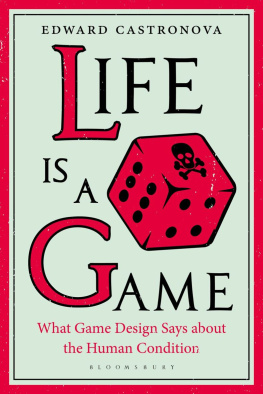

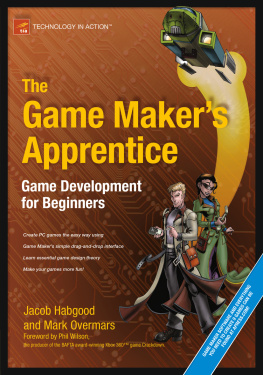
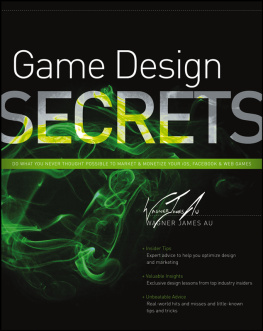
![Jesse Schell [Jesse Schell] - The Art of Game Design, 2nd Edition](/uploads/posts/book/119435/thumbs/jesse-schell-jesse-schell-the-art-of-game.jpg)
![Wagner James Au [Wagner James Au] - Game Design Secrets](/uploads/posts/book/119431/thumbs/wagner-james-au-wagner-james-au-game-design.jpg)
![Ethan Ham [Ethan Ham] - Tabletop Game Design for Video Game Designers](/uploads/posts/book/119417/thumbs/ethan-ham-ethan-ham-tabletop-game-design-for.jpg)
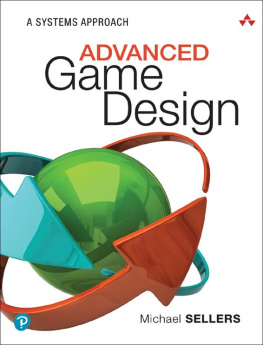
![Chris Bateman [Chris Bateman] - Beyond Game Design: Nine Steps Toward Creating Better Videogames](/uploads/posts/book/119409/thumbs/chris-bateman-chris-bateman-beyond-game-design.jpg)
